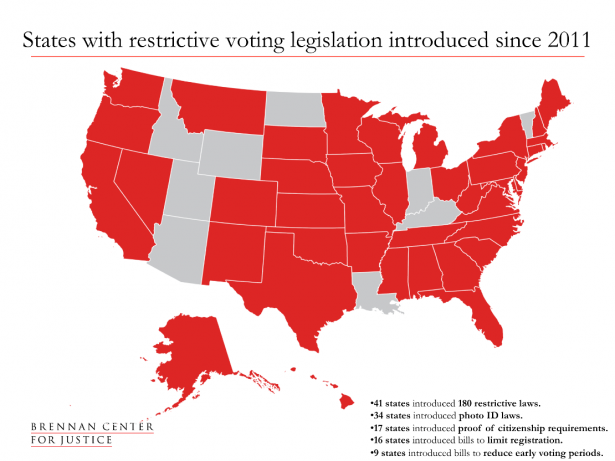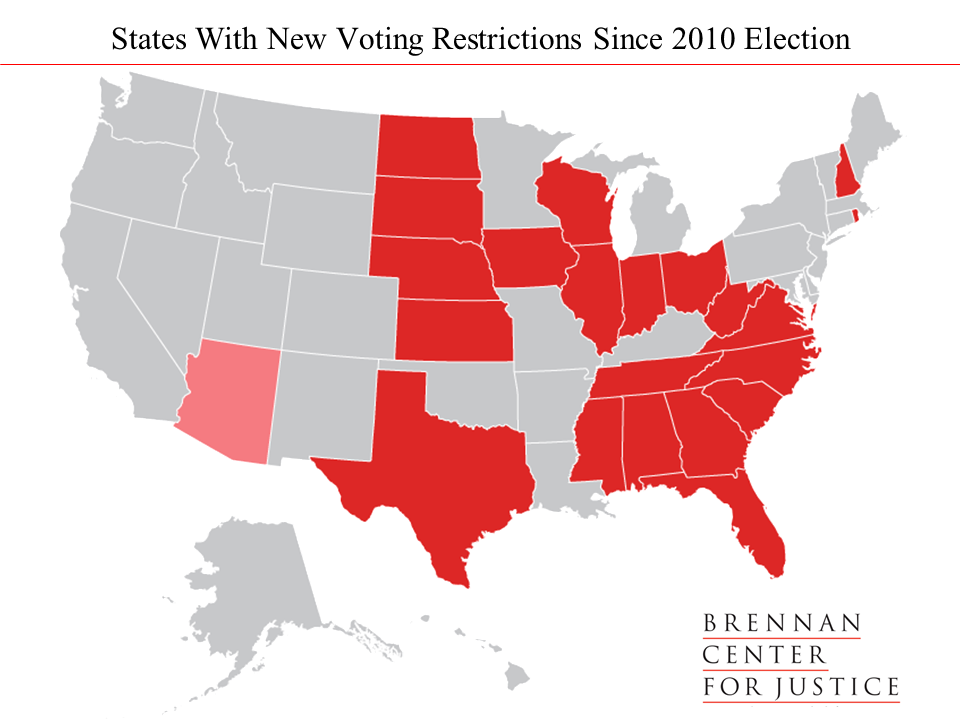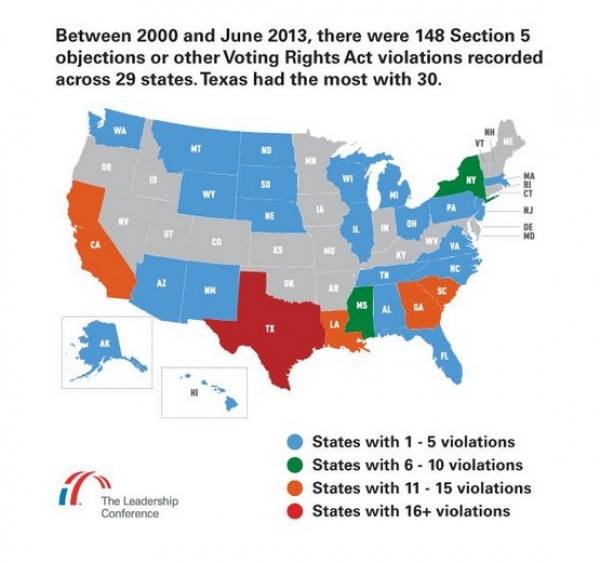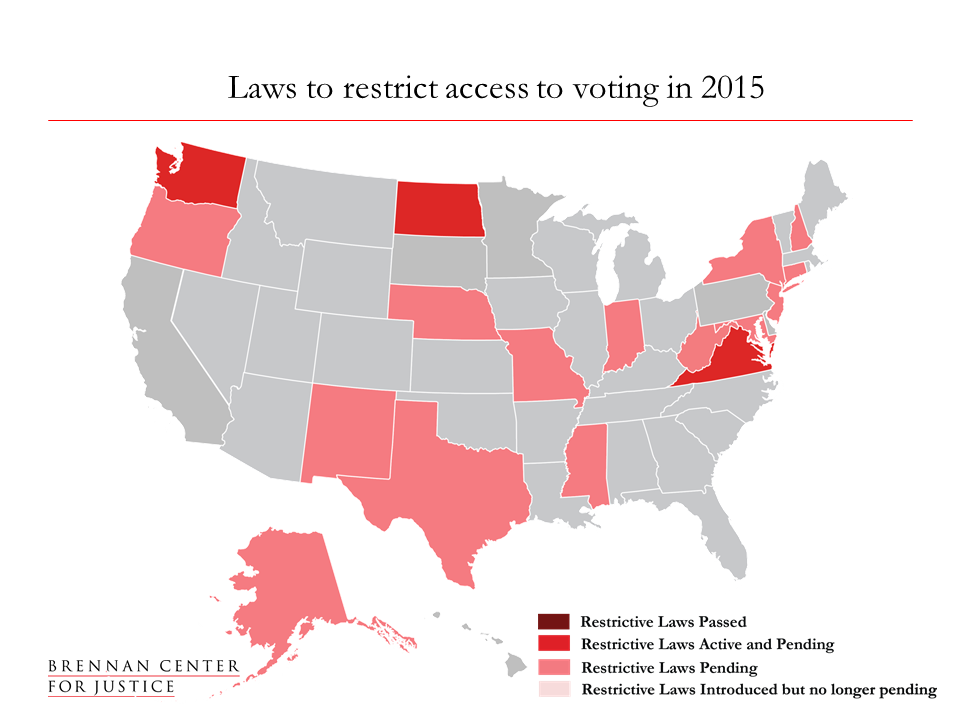This post first appeared at The Nation.
Tens of thousands of people — including President Obama — will travel to Selma this weekend to commemorate the fiftieth anniversary of “Bloody Sunday,” the infamous march that led to the passage of the Voting Rights Act.
The progress since then has been remarkable. Because of the VRA, the number of black, Hispanic and Asian officeholders has skyrocketed from under 1,000 in 1965 to over 17,000 today. “African-Americans went from holding fewer than 1,000 elected offices nationwide to over 10,000,” according to a new report from the Joint Center for Political and Economic Studies, “Latinos from a small number of offices to over 6,000, and Asian Americans from under a hundred documented cases to almost 1,000.” In Alabama, the birthplace of the VRA, the number of black elected officials has increased from 86 in 1970 to 757 today.
Despite these dramatic improvements, the right to vote is currently under the most sustained attack since the passage of the VRA.
In 2011 and 2012, 180 new voting restrictions were introduced in 41 states, with new laws adopted in 19 states that made it harder to vote, according to the Brennan Center for Justice. Many of these laws were blocked in court in 2012, but a year later the Supreme Court gutted the VRA, dealing a devastating blow to voting rights. As a result, 21 states had new restrictions in place in 2014.
The attack on voting rights has spread to virtually every state in the country. From 2011 to 2015, 395 new voting restrictions have been introduced in 49 states (Idaho is the lone exception). Half the states in the country have adopted measures making it harder to vote. (Scroll to the bottom for a list of the states.)
Thanks to the Supreme Court’s Shelby County v. Holder decision, states with the worst histories of voting discrimination, like Alabama, no longer have to approve their voting changes with the federal government. The Southern states that were previously subject to “precelarence” have been particularly aggressive in curbing voting rights.
Alabama, Mississippi, South Carolina, North Carolina, Texas and Virginia have passed strict voter ID laws. Longtime voters have been turned away from the polls, such as a 92-year-old great-grandmother in Alabama who could not vote with her public housing ID or a 93-year-old Virginia woman who had been voting for 72 years but could not vote with an expired driver’s license.
Texas’s voter ID law, the strictest in the country, was blocked in 2012 under the VRA. But immediately after the Shelby decision, Texas officials announced it would go into effect. The law was blocked again in 2014 as an “unconstitutional poll tax,” but the US Court of Appeals for the Fifth Circuit overruled the court’s decision and approved the law for 2014, which the Supreme Court affirmed.
A month after Shelby, North Carolina passed the most sweeping voting restrictions in the country — requiring strict voter ID, cutting early voting, ending same-day registration and curtailing virtually every reform that made it easier to vote. A preliminary injunction against key provisions of the law was rejected by the courts.
As North Carolina shows, the restrictions go well beyond voter ID. Alabama required proof of citizenship for voter registration. Florida cut early voting, shut down voter registration drives and disenfranchised ex-felons. Georgia drastically reduced the number of early voting days and is poised to cut it again. Local jurisdictions like Augusta, Georgia, and Pasadena, Texas, have changed their election structures to make it harder for minority candidates to be elected.
This trend is getting worse in 2015. In the first few weeks of this year, 40 new voting restrictions were introduced in seventeen states. That number will grow as state legislatures consider proposed legislation. Nevada, New Mexico and Missouri are among the states moving to pass voter-ID laws. “It’s surprising and remarkable that in 2015 we’re fighting over the same thing we fought over 50 years ago — the right to vote,” says Wendy Weiser of the Brennan Center.
What can be done to combat the attack on voting rights? I suggested a few ideas in “How to Protect the Vote,” from aggressively enforcing the remaining provisions of the VRA to passing electoral reform to ratifying a constitutional amendment guaranteeing the right to vote.
The best starting point would be for Congress to revise and restore Section 4 of the VRA, the formula determining which states have to approve voting changes with the federal government. The Voting Rights Amendment Act of 2014 would place the worst actors under federal supervision and serve as a deterrent to other states toying with voting discrimination.
The legislation has bipartisan support in the House but has thus far gone nowhere, even though Congress recently unanimously passed a resolution awarding the Congressional Gold Medal to the Selma marchers and 100 members of Congress will visit Selma on a civil rights pilgrimage led by John Lewis.
The Selma anniversary offers lawmakers a prime opportunity to move from symbolism to substance. Congresswoman Terri Sewell of Selma recently told me: “My hope is that the bipartisan efforts we’ve made will move people to recommit themselves to restore the teeth back into the Voting Rights Act. Gold medals are great — I think it’s long overdue and much deserved that the foot soldiers are going to finally get their place in history, but the biggest tribute that we can give to those foot soldiers is fully restoring the Voting Rights Act.”
Ed note: The states that have passed new voting restrictions since 2011 are Alabama, Florida, Georgia, Illinois, Iowa, Kansas, Maine, Mississippi, New Hampshire, Ohio, Pennsylvania, Rhode Island, South Carolina, South Dakota, Tennessee, Texas, Virginia, West Virginia, Wisconsin (2011-2012); and Arkansas, Indiana, Montana, Nebraska, North Carolina, North Dakota (2013). See here and here for more details.







